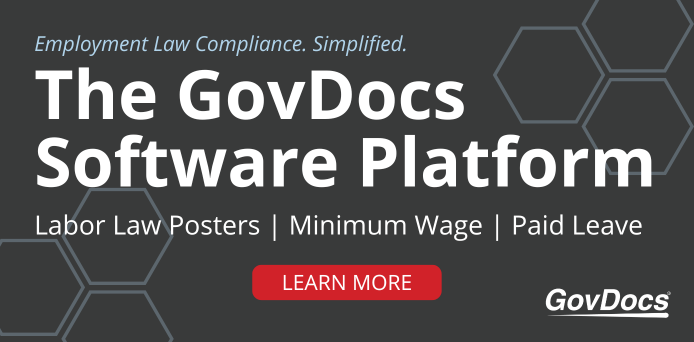EMPLOYMENT LAW NEWS
Top 5 Employment Law Trends in 2023
By Jana Bjorklund, GovDocs Senior Counsel and Director, Employment Law and Compliance
December 14, 2023

What were some of the top 2023 employment law trends? We examine a few highlights below.
Employment law compliance is always a challenge for employers that operate across the U.S. And 2023 saw the continuation of several trends, as well as new developments.
Below are five employment law trends from 2023. Of course, there are many other employment laws employers must monitor.
Employment Law Compliance. Simplified.
1. Paid Leave Updates
As if maintaining compliance with paid leave laws wasn’t complicated enough — monitoring accrual rates, accrual caps, carryover amounts, maximum use per year, determining eligible reasons for use, etc. — 2023 saw plenty of paid leave updates that HR needs to monitor.
There have been more than a dozen amendments to paid leave laws so far in 2023, along with a handful of new laws.
In California, for example, lawmakers amended the state’s paid sick leave law with several new provisions, including:
- Increasing the amount of leave to 40 hours (up from 24 hours)
- Raising the annual usage cap to 40 hours
- Increasing the carryover amount 80 hours (up from 48 hours)
Elsewhere, Colorado expanded the reasons for use under the state’s paid sick leave law, adding the following eligible reasons for leave:
- The need to grieve, attend funeral services or a memorial, or deal with financial and legal matters that arise after the death of a family member
- The employee needs to care for a family member whose school or place of care has been closed due to inclement weather, loss of power, heat or water, or other unexpected incident that results in its closure
- The employee must leave their home due to inclement weather, loss of power, heat or water, or other unexpected incident that results in the need to evacuate the residence
Connecticut added a “mental health wellness day,” among other items, to its paid sick and safe leave law.
As more jurisdictions pass paid leave legislation, it will be paramount for employers to monitor changes, whether through new bills or via guidance from government agencies.
Webinar: What’s New – Paid Leave in 2023
2. Recreational Marijuana and Employment Protections
In November, Ohio voters passed a law through a ballot measure which legalizes recreational marijuana. There are now nearly 25 states with such laws on the books.
As a result of new recreational marijuana laws, one trend that has developed lately are employment law protections for employees who use marijuana.
Many jurisdictions bar employers from adverse action against workers for a positive drug test. For example, in Washington, D.C., employers cannot refuse to hire or take adverse action against an employee for using recreational marijuana, participating in a medical marijuana program, or failing to pass a drug test for marijuana.
Likewise, the Illinois Right to Privacy in the Workplace Act prohibits employers from refusing to hire, terminate, or discipline individuals who use lawful products during off-duty time. The state’s list of “lawful” products includes marijuana.
Meanwhile, in Virginia employers cannot require job applicants to disclose information regarding an arrest, criminal charge, or conviction for simple marijuana possession during the hiring process – including disclosures on any application for hire.
Keep in mind exceptions may exist in these laws so it is important to know the details of the law in the jurisdictions where your employees work.
Finally, it is always worth noting with this topic that marijuana remains illegal at the federal level and employers still have the right to maintain a drug-free workplace.
Guide: Recreational Marijuana – What Employers Need to Know
3. Continued Minimum Wage Activity
The federal minimum wage has been unchanged since 2009.
Since then, dozens of jurisdictions have created their own rates. That didn’t slow down in 2023.
Two new laws were passed in Colorado — Boulder County and Edgewater. Washington State will soon have another city with its own rate following the enactment of a minimum wage ordinance in Bellingham.
There has also been a recent trend from lawmakers reviewing tipped employee wages. Chicago is phasing out its tipped minimum wage, as is Washington, D.C.
Other legislation has also been introduced regarding tipped employee wages, including:
- Colorado – Issued proposed amendments to COMPS Order updating tip credits and pooling rules
- Wisconsin – Introduced a bill to eliminate state’s tipped employee wage
- Montgomery County, Md. – Held hearings on increasing tipped employee wage
- Prince George’s County, Md. – Tabled a minimum wage measure to phase out the tipped employee wage
Meanwhile, California passed two minimum wage laws related to specific industries: fast food and healthcare.
And New York State (which also has industry-specific rates) finally moved from its Dec. 31 increase schedule to Jan. 1.
With more jurisdictions indexing their minimum wage rates annually, the elimination of subminimum wages, the Fight for $20 as the new minimum wage push, the increase of industry specific minimum wage rates and more, tracking and complying with minimum wage laws across the country will continue to be a significant challenge for employers.
4. Pay Transparency Laws
Perhaps the hottest trend of 2023 has been the rise in pay transparency laws.
There has been an increase in states requiring employers to include pay range information in job postings as well as providing disclosure of pay ranges to applicants and employees upon request.
- California
- Hawaii
- Illinois
- New York City
- New York State
- Washington State
Meanwhile, legislation has been introduced in Massachusetts, South Carolina, Tennessee, Washington, D.C., and elsewhere on this topic.
As public sentiment appears to be in favor of these laws, 2024 could be another year with additional pay transparency legislation.
Pay Transparency Laws by State
5. Non-Compete Laws
Lastly, laws banning or restricting the use of non-compete agreements have been on the rise in 2023.
New York State passed a law which:
- Prohibits non-compete agreements and certain restrictive covenants
- Authorizes covered individuals to bring a civil action against any employer or persons alleged to have violated a non-compete ban
And there are now four states that have banned noncompete agreements:
- California
- Minnesota
- North Dakota
- Oklahoma
Several other states have enacted certain restrictions such as setting a compensation threshold or requiring advance notice before entering into a non-compete agreement.
At the federal level, the Federal Trade Commission (FTC) in January 2023 proposed a new rule that would ban employers from imposing non-competes on their workers.
“The freedom to change jobs is core to economic liberty and to a competitive, thriving economy,” FTC Chair Lina M. Khan said in a statement. “Non-competes block workers from freely switching jobs, depriving them of higher wages and better working conditions, and depriving businesses of a talent pool that they need to build and expand. By ending this practice, the FTC’s proposed rule would promote greater dynamism, innovation, and healthy competition.”
With these and other bills on the table, this rounds out our list of 2023 employment law trends.
Employment Law Compliance Resources
Conclusion
These were but a few of the employment laws passed this year for HR teams to monitor. Maintaining compliance with the tide of new employment laws will continue to pose challenges for multi-jurisdiction employers in the years to come.
This Employment Law News blog is intended for market awareness only, it is not to be used for legal advice or counsel.
Keep Informed
with GovDocs Employment Law News
What is GovDocs?
GovDocs simplifies employment law compliance for large, multi-jurisdiction employers in the U.S. and Canada. The GovDocs software platform integrates three solutions in one convenient place to help you master the employment laws impacting your business. Whether you manage labor law postings, minimum wage or paid leave program, our products cut through research time, provide proactive insights into the everchanging landscape of employment laws and reduce the risk of noncompliance. The company is headquartered in Eagan, Minn.
The GovDocs Poster Store simplifies posting compliance for employers with less than 30 locations across all industries, offering a variety of posting products to meet your labor law compliance needs.





